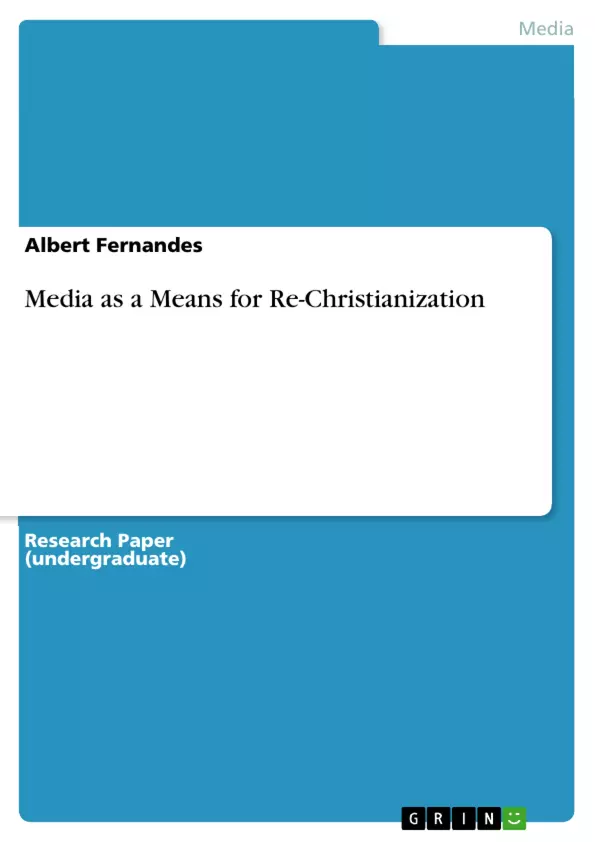The paradox of our times is that, we have taller buildings, but shorter tempers; wider freeways, but narrower viewpoints; we spend more, but have less; we buy more, but enjoy it less. We read too seldom, watch TV too much, and pray too seldom. We have multiplied our possessions, but reduced our values. We build more computers to hold more information. These are days of throwaway morality, overweight bodies, and pills that do everything from cheer to quiet and to kill. It is a time when there is much in the show window, and nothing in the stockroom. Indeed it’s all true.
Today, what is the role of religion in the lives of the people? We are more attuned to secularism then religion. One would advise the other not to mix up religion with the secularism. Religion is considered to be altogether a different entity and whereby, secularism is left to be by itself. Values promoted by secularism are widely spread and dominant. Today ecclesiastical documents are hardly of use for any government proves. Some people do not give importance to Church documents since they are of very less value in the secular world. The broken marriages are settled or separated lawfully in the civil court than in the church. Corruption is the trend of profit making. Relationships are mostly getting better for business purpose.
We are trained to be polite and gentle for business relationships. This is exactly what is called de-Christianization in the world of today. We need to work ardently towards re-Christianization today by using the effective means of social digital communication. This paper attempts to show ‘Media as a means for re-Christianization.’
Table of Contents
- INTRODUCTION.
- MASS MEDIA.
- FUNCTION OF MEDIA
- TYPES OF MEDIA
- CHURCH AND MEDIA TODAY.
- CONTRASTS AND TENSIONS
- TEMPTING ATTRACTION.
- NEW BEGINNING.
- EVANGELICAL ENTHUSIASM
- THROUGH TROUBLED WATERS.
- ATTRACTION OF INTERNET EVANGELISM IN THE WEB WORLD.
- NEED FOR RE-CHRISTIANIZATION
- MISSION OF RE-CHRISTIANIZING THROUGH MEDIA.
- CHALLENGING SITUATIONS FOR RE-CHRISTIANIZATION.
- STIMULATE A PUBLIC DIALOGUE OF FAITH.
- CHRISTIAN ALL ROUND EDUCATION AND DEVELOPMENT.
- PARTICIPATION AND NETWORKING
- CHURCH'S NET MISSION.
- CHRIST-ORIENTED COMMUNICATION THROUGH MEDIA.
- CHRISTIAN WITNESS - CORE OF THE MESSAGE
- UPHOLD A CULTURE OF Respect, DIALOGUE AND FRIENDSHIP TO RE-CHRISTIANIZE
- AUTHENTICITY OF LIFE IN THE DIGITAL MEDIA.
- CONCLUSION
Objectives and Key Themes
This seminar paper explores the potential of media as a tool for re-Christianization in a world increasingly influenced by secularism. It examines the challenges and opportunities presented by the current media landscape, arguing that the Church must embrace media to effectively communicate its message and engage with contemporary society.
- The role of media in shaping societal values and beliefs.
- The influence of secularism on religious practice and perception.
- The potential for media to facilitate re-Christianization and foster a dialogue of faith.
- The need for an authentic Christian witness in the digital age.
- Strategies for leveraging media for evangelization and fostering a culture of respect, dialogue, and friendship.
Chapter Summaries
- Introduction: This chapter introduces the concept of de-Christianization in modern society and proposes the use of media as a tool for re-Christianization. It argues that the Church must actively engage with media to reclaim its influence and communicate its message effectively.
- Mass Media: This chapter explores the meaning and function of “mass media” in contemporary society. It analyzes the various roles media plays, from news dissemination and entertainment to education and advertising.
- Church and Media Today: This chapter examines the complex relationship between the Church and media in the present context. It highlights both the challenges and opportunities presented by contemporary media, including the temptation to conform to secular values and the potential for new avenues of evangelization.
- Need for Re-Christianization: This chapter argues for the urgent need for a process of re-Christianization in a world where secular values are dominant. It highlights the disconnect between religious teachings and everyday life, emphasizing the importance of finding new ways to engage with faith.
- Mission of Re-Christianizing Through Media: This chapter delves into strategies for re-Christianization using media. It explores how media can be utilized to stimulate public dialogue about faith, promote Christian education and development, and foster participation and networking within the Church.
Keywords
The key concepts explored in this work include re-Christianization, media, secularism, Christian witness, digital media, communication, evangelization, and dialogue.
Frequently Asked Questions
How can media be used as a tool for re-Christianization?
Digital media and social communication can stimulate public dialogue about faith, promote Christian education, and foster a culture of dialogue and friendship.
What is de-Christianization in the modern world?
It refers to the shift towards secularism where religious values are marginalized, and secular principles dominate law, relationships, and daily life.
What role does the Internet play in modern evangelism?
The web allows for "Internet Evangelism," reaching people in the digital sphere and creating a "Net Mission" for the Church to engage with contemporary society.
Why is authenticity important in digital media for Christians?
Authentic living in digital media serves as a core Christian witness, making the message of faith more credible in a secularized digital environment.
What are the functions of mass media according to this paper?
Mass media functions include news dissemination, entertainment, education, advertising, and shaping societal values.
- Arbeit zitieren
- Albert Fernandes (Autor:in), 2011, Media as a Means for Re-Christianization, München, GRIN Verlag, https://www.grin.com/document/386204



